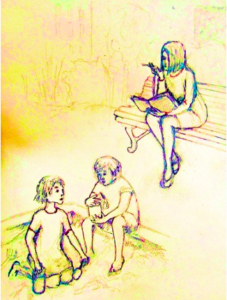
I was waiting at the top of the escalator, as we had agreed the night before by phone. The marble palace of the metro station Gorkovskaya, named after a Russian writer whose name means “bitter,” felt solemn enough for the occasion. I was peering into the face of every woman delivered by the moving stairs, as if each was a final product on a factory line reaching its destination. I watched their wandering looks, their wrinkles, the tensions of their mouths and speculated which one was my mother. Any of them could be.




